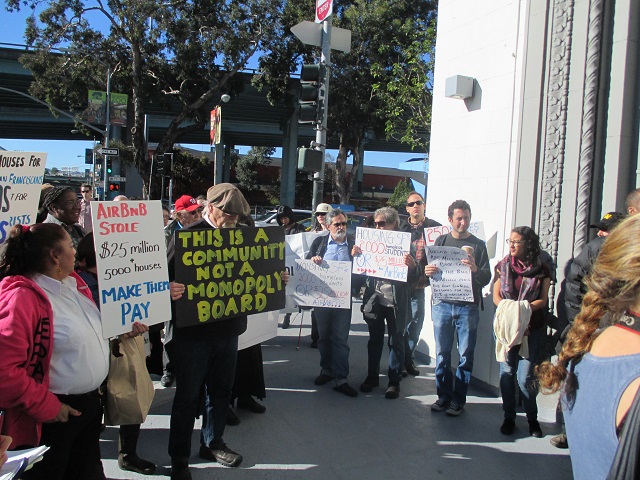Changes in the short-term rental law don’t address the major problem — so this fight is going to the November ballot

By Tim Redmond
APRIL 15, 2015 — Sup. Mark Farrell and Mayor Ed Lee introduced amendments to the city’s short-term rental law yesterday – but the legislation doesn’t address the major concerns of critics (or even the City Planning Department) and will do little to stop what looks like a major battle over a ballot initiative in November.
The new bill would limit all short-term rentals to 120 days a year, and provide a limited private right of action for neighbors who believe that the law is being broken. That action, though, doesn’t involve enough in the way of civil penalties to encourage any private lawyers to take the cases.
The measure would create a new Office of Short-Term Residential Rental Administration and Enforcement, “jointly staffed by the Planning Department, Department of Building Inspection, and the Tax Collector’s Office.” There is no new funding in the measure for that office.
City planners have complained that with more than 5,000 people using Airbnb and similar platforms for short-term rentals, and no additional enforcement staff, it’s impossible to keep track of the violations. So few people have registered for permits that the vast, vast majority of the existing Airbnb rentals are still illegal.
The most significant shortfall of the new bill, critics say, is that it fails to hold the hosting platforms – like Airbnb, a $20 billion business – liable for ensuring that the properties on their websites are following the local rules.
In Portland, Oregon, the hosting platform are required to monitor the listings and make sure that every single one has registered with the city and is following the local laws.
Help us save local journalism!
Every tax-deductible donation helps us grow to cover the issues that mean the most to our community. Become a 48 Hills Hero and support the only daily progressive news source in the Bay Area.
But San Francisco, under the existing law and the new amendments, doesn’t even require the companies to give the city information on where the rentals are – much less mandate that they take responsibility for making sure that they aren’t effectively encouraging illegal activity.
“I’m stunned,” Dale Carlson, who is among those working on a fall ballot initiative, told me.
Share Better San Francisco, the group working for tighter rules, noted:
This legislation moves us in the wrong direction. It exacerbates the incentives to illegally convert residential units to tourist accommodations. It completely indemnifies Airbnb and other hosting platforms that are aiding and abetting illegal activity. And it denies regular people the opportunity to effectively defend their own homes and neighborhoods.
The Planning Department has made it abundantly clear that the Airbnb legislation passed by the Board of Supervisors last fall is unenforceable. By failing to penalize hosting platforms that violate the law and denying regular San Franciscans their day in court, the amendments proposed today will make the unenforceability problem much worse.
And here’s the interesting political twist:
Airbnb will be a major issue in the District 3 supervisorial race. Challenger Aaron Peskin has been active in the coalition working for tighter rules, and the district has lost a lot of affordable housing stock to Airbnb.
But the mayor will have a hard time getting six votes for this bill unless his appointee, Sup. Julie Christensen, votes for it.
Peskin told me tonight that he sees the Lee/Farrell bill as “Airbnb’s dream. It’s still completely unenforceable and it does nothing to stop the bad actors from devastating the city’s housing stock.”
So in the middle of what looks to be a heated campaign, the mayor is forcing Christensen to take a difficult and potentially unpopular stand on an issue that involves one of the mayor’s biggest donors and allies, Ron Conway, a big investor in Airbnb – who is also supporting Christensen.
Was that smart? Does it matter when it comes to Conway’s dominance of City Hall? Or is this a game to bring all the parties to the table with a measure that might obviate a ballot fight?
I don’t know — but so far, these changes won’t do much of anything to undermine the initiative effort.




